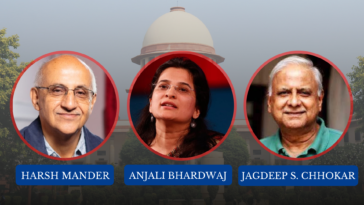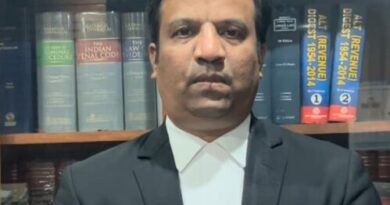Supreme Court Hears Tamil Nadu’s Plea on Governor Withholding Assent: Calls For Clarity On Constitutional Role & Accountability
(Judicial Quest News Network)
Delhi,6, February, 2025.The Supreme Court today continued hearing two critical writ petitions filed by the Tamil Nadu Government, challenging the actions of Governor Dr. R.N. Ravi for withholding assent to 12 bills passed by the state assembly. The issue revolves around the constitutional legitimacy of the Governor’s actions under Article 200 of the Indian Constitution, which governs the Governor’s power to either assent, withhold assent, or send bills back to the legislature.
A two Judges Bench comprising of Justices J.B.Pardiwala, and R. Mahadevan heard the petitions
Today the hearing began with Justice Pardiwala informing the lawyers about the eight questions framed by the court.
1. When Legislative Assembly has passed a bill and presented it to the Governor ascent Rohit holds his assigned there too and as a result therefore the Legislative Assembly passes the bill again and present it to Governor will it be open for him to reserve the bill for the consideration of president more particularly when he did not reserve it for the president when it was present at first instance.?
2.Whether discretion of Governor in reserving a bill for the president is accessible upon any bill or is it limited to certain specified categories particularly when the subject matter appears to be beyond the competence of the state legislature or recognised to a central law?
3. considerations made with the Governor when he decided to reserve the bill for consideration by the president?
4. what is the concept of pocket Veto?
5. off the expression shall declare used in the substantive part of article 200 can a time period be read in article 200 in which it is expected for the Governor or to pass a declaration?
6.how is the article 200 controlled into scenarios 6.1 bill is presented for Ascent and upon consideration the Governor returns the bill together with message requesting to consider certain aspects of Bill in terms of first provision to article 200 6.2 a bill is presented but upon consideration the Governor declares free with holds Ascent and therefore the legislature passes the bill and present it again to the Governor for Ascent weather the Governor bound to give Ascent in both scenarios?
7. when the president directs Governor to return the bill and the bill is passed and presented again to the president in what matter President to act?
it is mandatory required to attend to the bill when it is placed before him for reconsideration or is there a constitutional scheme in article 201 and if yes how is the silence to be construed?
8. Is it mandatorily required to assent to the bill when it is placed before him for reconsideration or is there a constitutional scheme in Article 201and if yes, how is the silence to be construed?
Constitutional Challenge to “Pocket Veto”
Representing the Tamil Nadu government, senior advocates Mukul Rohatgi, Abhishek Manu Singhvi, and P. Wilson argued that the Governor’s decision to withhold assent constitutes an unconstitutional act, a violation of Article 200. They contended that the Governor’s powers are advisory in nature and that withholding assent indefinitely, without explanation or sending the bills back to the state legislature for reconsideration, amounts to an unlawful “pocket veto.” Referring to the Punjab judgment, they pointed out that withholding assent should be followed by the Governor sending the bills back for reconsideration, rather than stalling the process without justification.
The Governor’s Role: Advisory or Decisive?
Justice Pardi Wala acknowledged the arguments, noting that the Governor’s role is primarily advisory and that the state legislature retains the final say in passing bills, even after they are returned for reconsideration. This was further elaborated upon when the court emphasized that under Article 200, the Governor must send the bill back if the assent is withheld, specifying the reasoning for such a decision, which the advocates for Tamil Nadu termed an anti-federal action if left unexplained.
The core issue discussed was whether the Governor’s “withholding assent” could be seen as a failure to act, as the legislative body must be given the opportunity to reconsider the bill. Senior advocate Rakesh Dwivedi argued that this prolonged inaction violates the constitutional framework, effectively allowing the Governor to “keep bills in cold storage” without providing clear reasons.
The Question of Presidential Reference
Another focal point was whether the Governor could refer the bills to the President for further examination, after withholding assent. Singhvi contended that the Governor’s powers should not extend beyond the scope provided in Article 200, where the final decision on bills lies with the state legislature unless there is a constitutional conflict. He further argued that asking the Governor to simply forward the bills to the President, without citing the reason for withholding assent, undermines the legislative process.
Attorney General Venkataramani defended the Governor’s actions, suggesting that the referral to the President was in line with constitutional procedures when there are “repugnant” laws. However, the court questioned whether this practice could become a formality that bypasses the necessary deliberation between the Governor and the state legislature.
Calls for Time-Bound Action
The court also raised the issue of a reasonable timeframe for the Governor to act on bills. Drawing parallels with the Speaker’s powers under the 10th schedule, where the court set a limit on the time for deciding disqualification petitions, the bench suggested that it might be necessary to set a time-bound framework for the Governor’s assent decisions, even though the Constitution does not specify a strict timeline.
Looking Ahead
As the hearing progresses, the court is expected to provide clarity on whether the Governor’s withholding of assent without providing reasons can be deemed unconstitutional, and whether such action can be overturned. The outcome of this case could set a significant precedent on the limits of executive power in relation to state legislation and the balance of power between the Governor, the legislature, and the President.
This case has significant implications for the functioning of federal governance, particularly regarding the autonomy of state assemblies and the role of the Governor as outlined in the Indian Constitution. The court’s ruling is anticipated to address these crucial issues and clarify the scope of the Governor’s powers.




